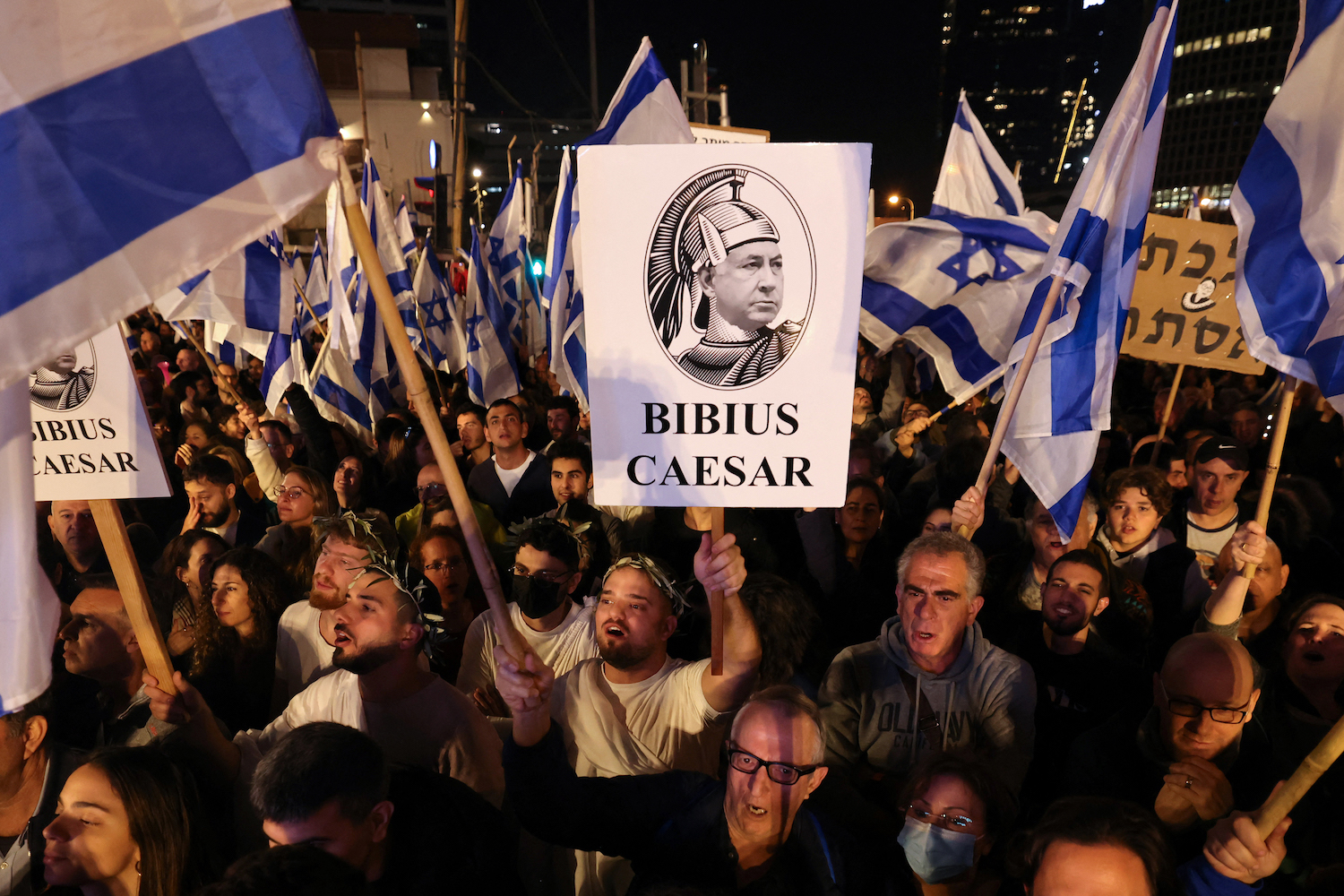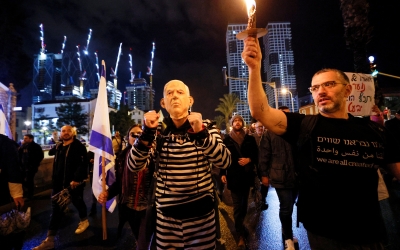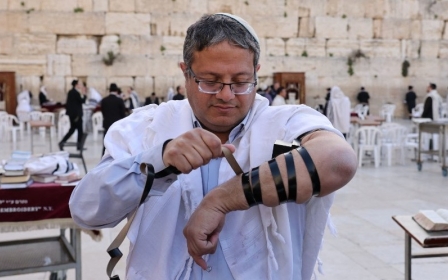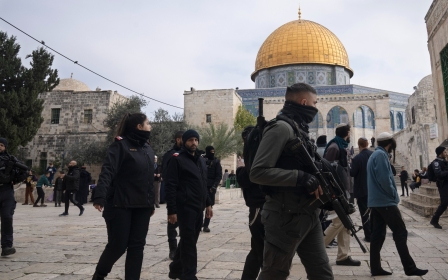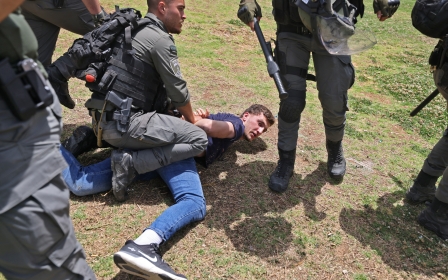Israeli fascism is splitting the Zionist camp. 48 Palestinians must forge own opposition
The rift within Israel among the political and social elites is rapidly driving the country towards an abyss with no end in sight.
Recent calls by far-right politician Almog Cohen of Otzma Yehudit (Jewish Power), along with one of the party’s most prominent leaders, former Brigadier General Zvika Fogel, to arrest former Defence Minister Benny Gantz, former Prime Minister Yair Lapid, and former Major General Yair Golan on charges of treason, is incitement to political violence.
The bigger threat is the transformation of all ministries headed by religious Zionist parties into truly sovereign entities
An indication of this was an attempt earlier this month by a pro-government driver from the Elad settlement to run down dozens of students in Beersheba protesting at the government's decision to limit judicial powers.
The policy change grants parliament the authority to overturn decisions by the Israeli Supreme Court with a simple majority vote, and the right to appoint judges.
Cohen and his party also played a role in establishing a network of semi-official armed militias dedicated to attacking 1948 Palestinians in the Naqab (Negev) and coastal cities. The militias are backed by the Israeli police.
Cohen also previously boasted about how he had trampled over a father and his two sons from the Bedouin town of Rahat in the Naqab while he was a "riot" officer in the border police.
Struggle for legitimacy
The bigger threat, however, is the absence of Prime Minister Benjamin Netanyahu’s authority and the consolidation of authority by all government ministries headed by members of the religious Zionist parties who are not bound by any orders or directives.
This was made official in late December, when Netanyahu and the Likud party signed coalition agreements - including appointments, detailed policies, and amendments. These agreements have become tantamount to law.
The struggle for legitimacy among the opposing politicians has become the most significant sign of an imminent crisis in Israel.
It further represents a shift rather than simple political discord, as the culture of right-wing hate and violence among the supporters of the religious Zionist parties, along with their leaders' reckless accusations of treason and rejection of the opposition’s legitimacy, may lead to an internal bloodbath.
On the surface, it appears that the centre-right movement and the remaining liberal newspapers accept the election results. But the legitimacy of the new government, in what is being dubbed a coup against the Israeli regime, is not being recognised.
Even the security establishment has been overrun by the tyranny of the current majority in the Knesset.
But what lies at the heart of the Israeli crisis is not a challenge to oppressive state policies, but rather the makeup of the ruling system. What Israel has long witnessed is that whoever controls the state apparatus holds the most power, even if they do not enjoy the support of the majority of citizens. To achieve this, the state apparatus is changed from within to benefit politicians' policies, even when their rule ends - if it ever ends.
For example, the swift compliance of the state apparatus, especially the police, which openly declared its adoption of Ben-Gvir's orders, is a sign of what is yet to come, and of the state of Israel’s internal balance of power.
The political divide in Israel is further characterised by the existence of two blocs vying for power, formed by the religious Zionist extreme right and the centre-right parties.
Meanwhile, the political arena is devoid of a true Israeli left that is self-sufficient and capable of fundamental political confrontation, especially with regard to the occupation and to racism.
The centre-right parties do not engage in aggressive confrontation with the extreme right; rather, they seek to preserve the "tools of the democratic game" and the state systems in their current form, particularly the judicial system and the separation of powers.
The Israeli centre-right - Yesh Atid, Blue and White/National Unity, and Yamina /Jewish Home - is persistent, methodical and quick to move in this regard, gambling on Jewish public opinion.
It is also not interested in an alliance with the Palestinian Arab masses, but is concerned with the latter's support for it, without raising its independent voice, without partnership, and on the basis of the agenda of the Israeli centre - which does not even address the issue of Palestine or the issue of racism towards the Palestinian citizens of its state.
Nevertheless, there appears to be a violent internal conflict taking place, which Israel has not witnessed since the mid-90s.
This is not a product of the centre-right that has joined the ranks of the opposition, but of the ruling religious Zionist right which is planning in advance to reshape the existing structure of state institutions and enforce its fascist ideology.
The prime minister is taking on the role of defending this approach and targeting the opposition and its legitimacy, playing the victim as though he is not part of the ruling system, even though he has been the longest-serving head of government.
Netanyahu is aware of the importance of hastening the "coup" before the conflicts erupt within his government and heterogeneous coalition. In return, Ben Gvir instructs the police to prevent disorder, referring to the opposition protests.
Transformation to a 'fascist state'
This situation leads to the weakening of Israel as a state from a Zionist perspective. Yet there are a number of possible exit strategies: Netanyahu could hasten unplanned military action in an attempt to protect his ruling position. This is unlikely, however, at least in the short term.
Instead, the leaders of the far-right coalition are bringing about a fundamental change in state institutions and creating a very deep rift within Israeli society.
The transformation of Israeli 'democracy' into a dictatorship and fascist state is the root of the crisis with US Jews and the Biden administration
The transformation of Israeli "democracy" into a dictatorship and fascist state is the root of the crisis with US Jews and the Biden administration. It appears that Netanyahu is seeking to preserve the facade of democracy for his government and win international legitimacy.
Another unlikely scenario in light of the current balance of power in Israel would be to overthrow Netanyahu's government.
This instability is what is prompting large numbers of the population to leave the country. This may also lead to a deterioration of the Israeli economy, its credit rating, and the level of investments in it - which is the indicator of a comprehensive crisis.
On the other hand, the supporters of these ruling parties, which include terrorist groups of settler organisations and militias, are ready to storm the Knesset and the Supreme Court when it is deemed necessary.
Indeed, it is no coincidence that the three religious Zionist parties consciously wanted to be handed ministries that deal exclusively with the Palestinian issue in all of historical Palestine, on both sides of the "green line".
Yet even among the opposition groups, issues related to '48 Palestinians - the violation of their collective rights and the racism they experience structurally and personally, as well as the ethnic cleansing and Judaisation of the Naqab - are either legitimised or ignored.
Structural racism continues
In fact, opposition groups will often fan the racist flames in an effort to gain the legitimacy of the Israeli street, such as their opposition to activists raising the Palestinian flag in anti-government demonstrations.
Therefore, this requires that Palestinian citizens of Israel re-organise their political and popular movement in order to protect their people and cause.
The only way forward would be to adopt a two-track strategy to resist the fascist government, one for the Israeli opposition, and the other for the Palestinian Arab masses
Additionally, their opposition to the current government must diverge from the Israeli one - an independent resistance movement based on their own unique agenda.
In the current climate, there are enough indications that the transition to fascism is not yet complete. But the fascist drift has only strengthened since the far-right parties took control of the government and its state apparatus.
In short, Israel is in the midst of political transformation that will have far-reaching implications on the international, economic and financial levels, and it is expected to worsen in the near future.
While the opposition to Netanyahu's government has forcefully awoken and challenged his legitimacy, the protesters are consciously interested in being Israeli-Zionist, with no consideration for the issue of Palestine, the struggles of '48 Palestinians, or even seeking their equal partnership.
The only way forward would be to adopt a two-track strategy to resist the fascist government, one for the Israeli opposition and the other for Palestinian citizens of Israel who are unfairly targeted, attacked, criminalised, or cast out of the political conversation altogether.
Still, all Palestinian, Arab and international pressure to delegitimise the Israeli ruling coalition is necessary and may help in resolving matters and changing the internal balance.
The views expressed in this article belong to the author and do not necessarily reflect the editorial policy of Middle East Eye.
Middle East Eye propose une couverture et une analyse indépendantes et incomparables du Moyen-Orient, de l’Afrique du Nord et d’autres régions du monde. Pour en savoir plus sur la reprise de ce contenu et les frais qui s’appliquent, veuillez remplir ce formulaire [en anglais]. Pour en savoir plus sur MEE, cliquez ici [en anglais].



